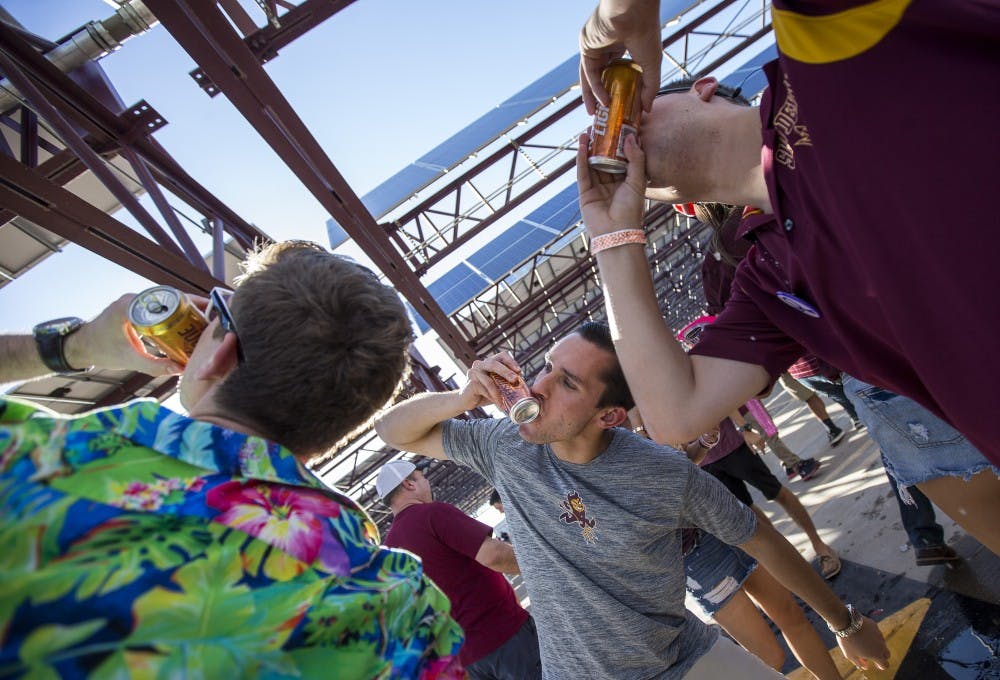When I was preparing to graduate high school in 2009, ASU was sort of this mirage far off in the distance. I wouldn’t find myself as a student there for another six years, but I remember being jealous of friends heading straight from high school to what we all assumed would be a four-year, booze-fueled romp through Tempe.
Even before I went to ASU, I’d spend weekends on leave away from Camp Pendleton and come back to Tempe, partying with my now-enrolled friends at their just-off-campus houses. Houses that seemed dedicated to hosting parties and little else.
Now though, at age 25 and with most of my “college party” days behind me, I could care less about going to a party school.
I go to school mostly on the Downtown Phoenix campus, where school feels more like work as you’re surrounded by depressed journalism students in a suit they’ve worn three days in a row.
It’s not a party atmosphere, and that begs the question, is ASU still a “party school?”
It begs another question, too: “Who cares?”
After a lot of searching through “bro” blogs, websites of ill repute, and also the Huffington Post, I was able to gather at least somewhat of an image of where ASU has stood in party school rankings since I left high school.
I do have to warn you though, multiple publications from Playboy to the Princeton Review have published “official” party school lists. It’s a subjective, and in all seriousness, ridiculous way to rank schools.
In any case, in 2009, Playboy ranked ASU as the 6th best party school in the nation. ASU disappeared from later lists, until making an emergence in 2013. The past few years, ASU hasn’t even cracked to top 20 of Princeton Review’s annual party school list.
So, what happened around 2013? Well, ASU was making headlines for its party scene, and not in a good way.
Frat Row was shut down near the beginning of the decade, and soon fraternities began locking down housing in Tempe proper, leading to several incidents. One notable accident involved a 17-year-old girl on a campus tour trip receiving serious burns in the backyard of a particularly wild house party.
There was also the case of Jack Culolias, a fraternity pledge who was found dead in Tempe Town Lake two weeks after he stumbled out of a fraternity event intoxicated.
It’s no wonder that a university would look to crack down on this sort of atmosphere. Although University president Michael Crow said that he didn’t think the idea of ASU as a party school was “reality," popular opinion seems to suggest otherwise.
I suppose that’s all irrelevant now in 2016, where the viability of ASU’s “party school” status seems to be all but disappearing. That's what Earth and space sciences freshman Carly Thunberg feels.
"I feel like partying happens everywhere," Thunberg said, "I wouldn't consider it (ASU) more of a party school than any other school."
Thunberg is right, parties will happen at any school you go to, in every state and every college town you visit. The idea of a school being a “party school” is a ridiculous idea, because college is whatever you want it to be.
If you want to spend four years at school stumbling from party to party, you will find success at ASU.
If you want to spend four years at school keeping your head down, studying and graduating with honors, ASU is definitely the place for you.
And if you want to spend four years doing whatever you want with your life, ASU is still your place.
That’s because college, and what you get out of it, is subjective. You shouldn’t choose schools based on parties or bowling alleys in student unions or any trivial things like that.
Can you succeed here? Do you want to be here?
Is ASU a still a party school? It’s a bit of a cop-out, but I’ll still stick with “Who cares?”
Reach the columnist at cjwood3@asu.edu or follow @chriswood_311 on Twitter.
Editor’s note: The opinions presented in this column are the author’s and do not imply any endorsement from The State Press or its editors.
Want to join the conversation? Send an email to opiniondesk.statepress@gmail.com. Keep letters under 300 words and be sure to include your university affiliation. Anonymity will not be granted.
Like The State Press on Facebook and follow @statepress on Twitter.




